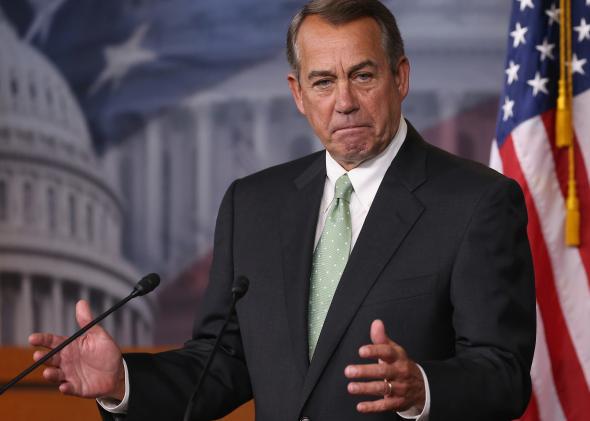Thanks to today’s 6–3 Supreme Court decision, Obamacare’s crucial insurance subsidies have been saved, and King v. Burwell has been laid to rest. But hope springs eternal for conservatives who would like to litigate the president’s signature legislative achievement into oblivion. And right now, believe it or not, there is yet another case revving up that at least some people think could pose a dire threat to the health care reform law.
On the other hand, it might also just be futile exercise in Republican wishful thinking. So let’s discuss.
Last November, the GOP-led House of Representatives filed a lawsuit arguing that the Obama administration had overstepped its executive authority by spending money without Congress’ permission to implement a little-known but important piece of the Affordable Care Act known as “cost-sharing reductions.” The rules are designed to make insurance more affordable to lower-income Americans who buy coverage on public exchanges; insurance companies have to limit out-of-pocket costs like co-pays and deductibles. In return, the federal government pays a subsidy directly to the insurers in order to cover their expenses. If this sounds like a slightly roundabout and confusing system to you, well, at least it’s simpler than cutting every working-class family a check each time they visit the doctor.
The problem, according to the House lawsuit, is that while the entire cost-sharing reduction program is part of the Affordable Care Act, Congress never got around to appropriating any dollars for the subsidy payments. So, how has the administration been reimbursing insurers? It pulled funds from another, permanent pool of money designed to cover tax credits, such as the insurance subsidies that were at issue in King v. Burwell. Secretary of Health and Human Services Sylvia Mathews Burwell says this was meant “to improve the efficiency in the administration of subsidy payments.” The House Republicans say it was just a workaround designed to flout the will of Congress. “The Executive Branch has no authority to expend public funds that have not been [properly] appropriated,” the suit notes.
At first blush, this case doesn’t look especially great for the administration. For instance, the White House asked for money to fund cost-sharing subsidies in its 2013 budget. When Congress shrugged in response, Health and Human Services found money in the tax-credit account. All of this might suggest that officials knew they needed an appropriation, then conveniently ignored that fact.
Now here’s why some people are convinced this case could completely mangle Obamacare. The cost-sharing reduction subsidies are quite large—the House suit says they could total $178 billion over 10 years. But even if the administration had to stop paying them because of a loss in court, insurers would still be required by law to offer many Americans a break on their out-of-pocket costs. That would be expensive and likely force premiums up. As premiums go up, more people would likely leave the insurance markets and you could, theoretically, get something like the death spiral King v. Burwell could have caused had the Supreme Court ruled the other way.
“Were the House to succeed in this claim, the consequences would be nearly as devastating as those that could follow from King v. Burwell,” Washington and Lee University law professor Timothy Jost wrote recently. Chris Jacobs, policy director at Bobby Jindal’s America Next, agrees, though he’s a bit happier about it. “If King v. Burwell … represents an existential threat to Obamacare,” he wrote last year at the Wall Street Journal, “the implications of the Boehner lawsuit come a close second.”
But maybe it doesn’t. There are several reasons this lawsuit could amount to a lot of noise, and not much else. First, it’s not clear yet that the House actually has the legal standing to sue the administration. It needs to show that, somehow, its own members were harmed by the administration’s decision to pay out the subsidies. And while you could say that ignoring the dictates of Congress damages the institution, typically, the courts don’t relish the idea of refereeing political disputes between the other two branches of government. If the House loses on that score, the suit is done.
But even if they win the right to argue their case, the House Republicans’ argument might be a lot more feeble than it looks, as David Super, a Georgetown University law professor, explained to me. By passing the Affordable Care Act and instructing the administration to pay insurers their subsidies, Super said, Congress effectively appropriated the funds to do it. “The Supreme Court has been very clear that you do not have to have a law that says ‘appropriations’ across the top. You just need a law directing that the money be spent,” he said.
But there are even deeper reasons the case might not in fact be a very effective weapon against Obamacare. If the administration did lose at court, insurers would still be entitled to their subsidy payments under the law. Therefore, they could simply file their own suit against the federal government at the Court of Federal Claims and collect the money owed to them.
“Even if one imagines this case winning, which I have great difficulty imagining, the result would be that the insurers would have to take a few extra steps to get reimbursed, not that the money would not flow,” Super said. “In cases like that, the courts have generally been pragmatic, and not required the filing of a lawsuit that everybody knows would win.”
So, I asked, what were the chances of one day seeing the House case at the Supreme Court?
“Because so little is at stake, it’s hard to imagine it getting to the Supreme Court. But even if the court took a very strange view and ruled in favor of it, it’s hard to see it as an existential threat to the law, because the money would still be provided.”
Perhaps conservatives will have to find another source of hope.
